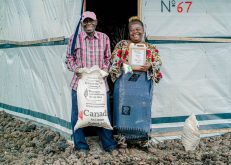Sub-Saharan Africa needs a “Green Revolution” investing in agricultural technology to boost food security after decades of underinvestment, a United Nations agency said May 19.
The UN Conference on Trade and Development (UNCTAD) said in a report that technology and innovation must be targeted at the needs of Africa’s millions of smallholder farmers and reflect varying climate conditions, rather than being simply copied from advances in Asia and Latin America.
Africa’s capacity to provide food has declined by one-fifth over the past 40 years, UNCTAD Secretary General Supachai Panitchpakdi told a briefing on the report.
Read Also

Mazergroup’s Bob Mazer dies
Mazergroup’s Bob Mazer, who helped grow his family’s company into a string of farm equipment dealerships and the main dealer for New Holland machinery in Saskatchewan and Manitoba, died July 6 from cancer.
“There has been a severe deterioration in the way that agriculture should have been addressed, supported by the national governments, supported by the international community and also supported by the kind of technology and innovation methodology that could really prove to be of great help as it has done in Asia,” he said.
Sustained lack of public investment, exacerbated by the virtual exclusion of the private sector from agriculture, has left many states in Africa, once a net food exporter, dependent on imports for food, the report notes.
Agriculture is also the key to tackling poverty in Africa, where it makes up a bigger share of the economy than in other regions and accounts for most employment, said one of the authors of the Technology and Innovation report, Angel Gonzalez.
Agriculture comprises 16 per cent of gross domestic product in Africa against six per cent in Asia, while 60 per cent of employment is based on the sector, of which more than 95 per cent are smallholder farmers, he told the briefing.
Supachai said the critical task was to drive up yields.
This could be done by adopting simple technologies suitable for small farmers such as low-cost drip irrigation, or using plastic buckets to store rainwater.
African farmers should also be helped to work with new crop varieties. One example is “New Rice for Africa” (Nerica), an Asian-African hybrid developed in Africa with Japanese support, that combines drought resistance with high yields, he said.
Nerica is not a genetically modified organism (GMO), but UNCTAD officials said there was a role for GMOs, already used in South Africa for some varieties of rice, while policy-makers had to consider the risks for biodiversity and trade.
Innovation goes beyond technology. The report notes how a policy of “smart subsidies” to ease access to fertilizers has resulted in staggering increases in maize production in Malawi, showing the key role played by credit and other instruments in improving access to existing technology.


















